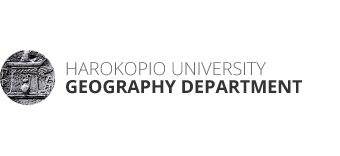Coastal Geomorphology
Semester: 6th, 8th | Optional | ECTS: 5.0
Module leader: Karymbalis Efthimios
Semester: 6th, 8th | Optional | ECTS: 5.0
Module leader: Karymbalis Efthimios
The course is an introduction to coastal processes and coastal landforms as well as to coastal zone management issues.
One of the basic aims of the Coastal Geomorphology course is to empower students in better understanding of coastal processes, that act along the coastline (waves, tides, currents, long-term sea-level changes, aeolian processes) and the study of coastal landforms which are the main result of these processes.
The course also considers some of the practical issues like various methodologies of coastal geomorphological mapping. Lectures include laboratory tutorial which help students become familiar with practical aspects like the calculation of long-term coastal erosion rates, record of impacts of the anticipated sea-level rise on coasts, susceptibility assessment of coastal areas to natural hazards, grain-size analysis of coastal sediments etc.
During the course a one-day field-trip is organised. The aim of the field-trip is the assimilation of the theoretical knowledge and the recognition of coastal landforms and indicators of sea-level changes in the field.
Lecture: Basic issues of coastal environments. Coastal processes, waves, wave refraction, wave reflection, longshore currents, littoral drift. Sea-level, sea-level changes during Upper Pleistocene, Sea-level fluctuations during Holocene, eustatic changes, local changes. Coastal landforms, landforms of marine erosion, coastal cliffs, marine deposit landforms, beaches, tompolo, beachrocks, berms, river deltas. Aeolian coastal landforms, coastal sand dunes. Beach cusps, ripple marks. Grain size analysis of coastal sediments. Coast classifications.
Laboratory: Tutorial exercises include four works: definition of wave characteristics for various coastal areas using bathymetric maps, paleo-shoreline reconstruction of the central Aegean sea islands using maps. Geomorphological mapping of river delta areas using aerial photographs and sampling and grain size analysis of coastal sediments.
Duration: 13 lectures and laboratory tutorials 3hours/week. Lectures 2 hours/week and laboratory tutorials 1 hour/week. Tutorial exercises include four exercises handed out during the class (usually every week). It should be mentioned that attendance of the laboratory tutorials is compulsory.
Assessment method is a final written exam at the end of the term. Prerequisite for participation at the is the implementation of the 4 laboratory works.
Implementation of the 4 laboratory works counts for the 30% of the final result while the final exam counts for the 70% of the final result.
FIRST STUDY CYCLE
1st Semester | Winter | 30 ECTS
2st Semester | Spring | 30 ECTS
FIRST STUDY CYCLE
3rd Semester | Winter | 30 ECTS
4th Semester | Spring | 30 ECTS
FIRST STUDY CYCLE
5th Semester | Winter | 30 ECTS
6th Semester | Spring | 30 ECTS
------
Set Ι - Physical Geography
------
Set ΙΙ - Human Geography
------
Set ΙΙΙ - Spatial Planning
------
Set IV - Geoinformatics
------
Additional Modules
------
SECOND STUDY CYCLE
7th Semester | Winter | 30 ECTS
------
Set Ι - Physical Geography
------
Set ΙΙ - Human Geography
------
Set ΙΙΙ - Spatial Planning
------
Set IV - Geoinformatics
------
Additional Modules
8th Semester | Spring | 30 ECTS
or alternatively
------
Set Ι - Physical Geography
------
Set ΙΙ - Human Geography
------
Set ΙΙΙ - Spatial Planning
------
Set IV - Geoinformatics
------
Additional Modules
------
Geography Department
Harokopio University
Eleftheriou Venizelou Ave., 70
GR-176 76 Kallithea | Athens | Greece
Undergraduate Secretariat:
t: +30 210 95 49 150
t: +30 210 95 49 151
f: +30 210 95 49 376
E-mail: geosec@hua.gr
Postgraduate Secretariat:
t: +30 210 95 49 325
f: +30 210 95 49 376
E-mail: geosecpost@hua.gr
The following link leads to Harokopio University website.
